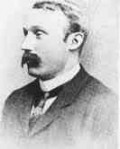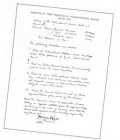|
With the ongoing dispute over the future of of the Heineken Cup we could do with a man like Carrick to reach the parts that others couldn't reach in the words of their famous advertising slogan
James S Carrick
Setting the scene
England vs Scotland 1 March 1884
England 1 goal from a try; Scotland 1 try
Scotland were leading by a try to nil[1] when one of their players, CW Berry, "knocked back" the ball near their line when it was "thrown out from touch" - in modern parlance, in a lineout. It soon came to RS Kindersley of England, who promptly ran in for a try. There followed a disputatious 10 minutes (or more) as the Scots argued the try should be disallowed. Eventually the game was resumed, and, under protest, WN Bolton kicked what was to be the game (and championship) winning goal.
Since part of this dispute turned on a question of law, here is the relevant passage:-
LAW 26 Knocking On ie hitting the ball with the hand, and Throwing Forward ie throwing the ball in the direction of the opponents' goal line are not lawful. If the ball be either knocked on or thrown forward, the opposite side may (unless a fair catch has been made as provided by the next rule) require to have it brought back to the spot where it was so knocked on or thrown forward, and there put down.
The law was well established by 1884, having been essentially in effect for International Matches since 1871.
After the match the Scots continued to vigorously dispute the decision to allow the English try, and hence their winning goal. So aggrieved were they that they attempted to have the decision overturned by appeal after the match was over.
Enter James S Carrick
Carrick was a quite outstanding sportsman being capped at both Rugby and Cricket and even found time to be secretary of one of the oldest surviving private swimming baths in the world the Western Baths still there just off Byres Rd
James.S Carrick--West of Scotland Cricket Club and Glasgow Accies a
great cricketer and a founding father of International Rugby Board
He was one of that select band who represented Scotland at more than one sport having been capped at both rugby and cricket During his term of office as president of the Scottish Football Union he oversaw the creation of the International Rugby Football Board
In 1884 England had a disagreement with Scotland over a try that
England had scored but the referee disallowed citing a foul byScotland. England argued that the referee should have played advantageand since they made the Law, if they said it was a try then it was. The International Rugby Football Board (IRFB) was formed by Scotland,Ireland and Wales in 1886 but England refused to join since theybelieved they should have greater representation on the board becausethey had a greater number of clubs. They also refused to accept that the IRFB should be the recognised law maker of the game. The IRFBagreed that the member countries would not play England until the RFUagreed to join and accept that the IRFB would oversee the games between the home unions. England finally agreed to join in 1890. His greatest moment came however in 1885 playing cricket for West of Scotland inscored 419 not out against Priory Park at Chichester, and thus passed Roe's world record of 415 made four years earlier
So disputes in the arena of international rugby between England and the Celts is really not new and a Carrick like figure is needed right now
This article was posted on 3-Oct-2013, 07:27 by Hugh Barrow.
|








